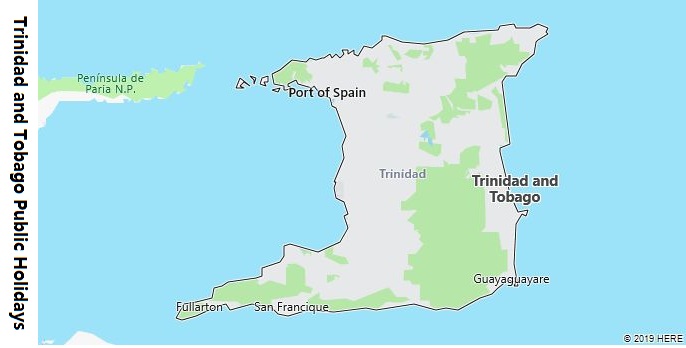Trinidad and Tobago Holidays
Trinidad and Tobago Public Holidays
Searching for the national holidays in Trinidad and Tobago? All public holidays in Trinidad and Tobago are treated like Sundays. This means that most of the Trinidad and Tobago employees have a day off and all schools are closed on these office holidays. If you are planning a trip to Trinidad and Tobago and want to know what the national and regional holidays are, check the details in the tables below.
List of Official Holidays in Trinidad and Tobago for Year 2020
| # | Date | Holiday | Day |
| 1 | January 01, 2020 | New Year’s Day | Wednesday |
| 2 | February 24, 2020 | Carnival Monday | Monday |
| 3 | February 25, 2020 | Carnival Tuesday | Tuesday |
| 4 | March 30, 2020 | Spritual Baptist Day | Monday |
| 5 | April 10, 2020 | Good Friday | Friday |
| 6 | April 12, 2020 | Easter Day | Sunday |
| 7 | April 13, 2020 | Easter Monday | Monday |
| 8 | May 24, 2020 | Eid-ul-Fitr | Sunday |
| 9 | May 30, 2020 | Indian Arrival Day | Saturday |
| 10 | June 11, 2020 | Corpus Christi | Thursday |
| 11 | June 19, 2020 | Labor Day | Friday |
| 12 | August 01, 2020 | Emancipation Day | Saturday |
| 13 | August 31, 2020 | Independence Day | Monday |
| 14 | September 24, 2020 | Republic Day | Thursday |
| 15 | November 14, 2020 | Diwali | Saturday |
| 16 | December 25, 2020 | Christmas Day | Friday |
| 17 | December 28, 2020 | Boxing Day | Monday |
List of Official Holidays in Trinidad and Tobago for Year 2021
| # | Date | Holiday | Day |
| 1 | January 01, 2021 | New Year’s Day | Friday |
| 2 | February 15, 2021 | Carnival Monday | Monday |
| 3 | February 16, 2021 | Carnival Tuesday | Tuesday |
| 4 | March 30, 2021 | Spritual Baptist Day | Tuesday |
| 5 | April 02, 2021 | Good Friday | Friday |
| 6 | April 04, 2021 | Easter Day | Sunday |
| 7 | April 05, 2021 | Easter Monday | Monday |
| 8 | May 13, 2021 | Eid-ul-Fitr | Thursday |
| 9 | May 30, 2021 | Indian Arrival Day | Sunday |
| 10 | May 31, 2021 | Indian Arrival Day (in lieu) | Monday |
| 11 | June 03, 2021 | Corpus Christi | Thursday |
| 12 | June 19, 2021 | Labor Day | Saturday |
| 13 | August 01, 2021 | Emancipation Day | Sunday |
| 14 | August 02, 2021 | Emancipation Day (in lieu) | Monday |
| 15 | August 31, 2021 | Independence Day | Tuesday |
| 16 | September 24, 2021 | Republic Day | Friday |
| 17 | November 04, 2021 | Diwali | Thursday |
| 18 | December 25, 2021 | Christmas Day | Saturday |
| 19 | December 27, 2021 | Boxing Day | Monday |















































